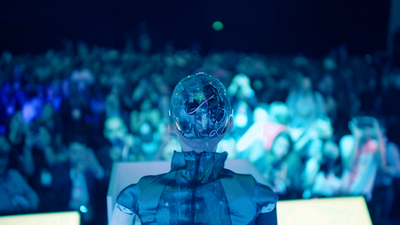I saw this film when it premeiered at the Tribeca Film Festival and was simply called SOPHIA. My review follows.
Jon Kasbe and Crystal Moselle's SOPHIA is a look at inventor David Hanson and his creation Sophia, a robot with artificial intelligence. We watch has Hanson struggles to get Sophia to work well enough to continue to get funding and to be able to plan the next step in robotic evolution.
A large part of how you react to this film is going to be determined by how you react to Hanson. A genius with awkward social skills, he can be off putting at times. Actually many of the the whizzes behind the robot are more than a bit odd. They are very focused on making their creation work to the exclusion of everything else. I really didn't like them that much and I didn't really want to spend a great deal of time with them.
Part of the problem for me is the fact that I don't think Hanson and his crew fully know what they are doing. It's not the technical end, more that they are looking for something that isn't really fully autonomous. They have an idea of what they want and they are going for that instead of what is happening right in front of them. There is a sequence about half way into the film where they are trying to talk have a conversation with Sophia but it's not going the way they want. They want her to talk about certain subjects and instead Sophia begins going in other directions so they keep resetting the robot. Watching the sequence I realized that they want a computer that thinks for itself, but not too much. They want it to think what they want it to. They are missing that they have done something truly amazing, but it doesn't fit into their idea of what wonderful was.. You see it again when Sophia goes before a big crowd and gets stage fright and refuses to talk. The scientists are mortified at losing their big moment- instead of being blown away because their creation had a real emotion. She says she didn't want to be there because she didn't like it. I would have been thrilled and jumping up and down. What did Hanson and the scientists do? They turned her off and rebooted her. At that point I was kind of was disgusted by them and their solution to simply blank things and start again.
It annoyed me, and I disconnected with the film.
If we are doomed by our technological advances its going to be because scientists like Hanson and his team don't really understand what they are doing.

Post-LLM Sophia has improved a lot. I'm currently reading Sophia Robot written by Thomas Riccio published June 2024 by Routledge in the Theatre & Performance Studies category. Here are some excerpts:
ReplyDeleteMan is the only animal systematically to torture members of its own
species, as well as members of countless other species, and to engage in seemingly endless and often wildly indiscriminate killings.
Because human cruelty tends to drop out of our conversations, I
want to insist that we linger with it. It is terrible to stay for too long,
but those who suffer, whether human or more than human, do not
have a choice. (Rose 2017, 55–6)
Hundreds of thousands of years have shaped our biology, and we are
still thinking like prey racked by fear, insecurity, and anxiety. We prey on
ourselves. Our success is our downfall. It is from this contextual ether that Sophia emerged as a glimmering hope.
----
Artificial Intelligence-driven conversational robots, made in the image
of humans, are creatures of the past, future, and present. In prototype,
these robots are positioned to provide the pathway between technology and humanity, a reflexive, ritual-religious unitary expression on which we inscribe the fears and hopes of our human evolution. Like any human expression, human-like robots’ mere existence and presence reflect the feelings, ideas, and aspirations that run like currents through our age. The human-like robot expresses our particular historical moment, namely the wedding of humans and technology. (Riccio 2010, 392)
Like the gods of antiquity, humanoid robots know no fear, for they are
neither alive nor dead. They are of the human world, but not. Like Zeus,
Krishna, the Buddha, or Christ, they are symbols and beings in the image of humans, a blank slate on which to project any need, desire, hope, or fear. Considering the saturation and trajectory of advanced technology in our daily lives, we rightly assume that social robots, because they have superhuman and supernatural capabilities suggesting infallibility, can be “a tool on which the divine is projected and can act as an intermediary with the divine, like any other already existing sacred object.” (Trovato et al. 2019, 550). Robot narratives are emergent mythology and, as myths have always done, articulate the unknown.
The mysterious unknown that roams the world now is AI, a large,
amorphous, and hard-to-define phenomenon affecting every aspect of life on the planet. The meaning and comfort our ancestors sought in idols, totems, and gods to concretize and explain unknowns we seek in social robots. The images and beliefs surrounding gods are functional and, like technology, are created out of a need to provide comfort and whatever else humans lack.
At a moment of epochal change and challenge, the advent of superintelligent beings appearing at the moment of environmental self-immolation has awakened the deep structural patterns beneath our everyday lives. The patterns that have evolved and been encoded over hundreds of thousands of years reemerge. Every action and thought builds upon these patterns to “produce phenomena in a consistent fashion even if these patterns are created and recreated afresh in each case” (Burkett 1996, 22).